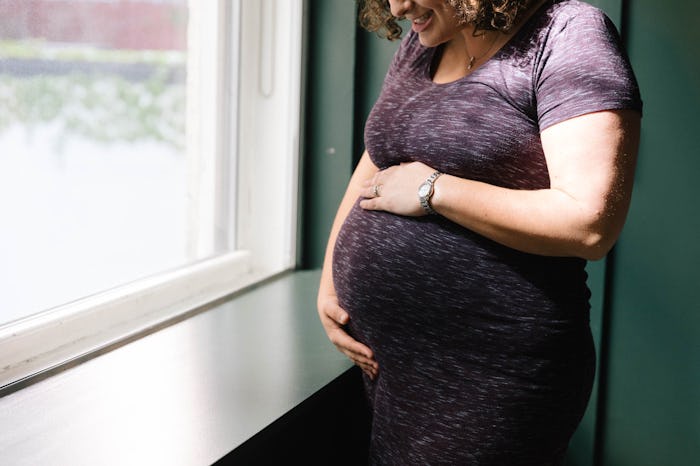Life
If Your Doctor Says You're Having A Big Baby, Here's What They Really Mean
As much as we all want to have a big, chubby, healthy baby... the actual logistics of delivering a big baby can make moms nervous. If your doctor tells you that your baby's getting "pretty big in there," does that mean you're destined for an even more painful birth? Labor is labor, but the difference between a 7-pound baby and a 10-pound baby can feel pretty extreme. If you're wondering exactly what having a big baby means for mom, you're certainly not alone. From prenatal to delivery to postpartum, these are the various things that having a larger than average baby might mean for mom.
There's actually an official term for babies that are larger than average: fetal macrosomia. According to the Mayo Clinic, "A baby diagnosed with fetal macrosomia has a birth weight of more than 8 pounds, 13 ounces (4,000 grams), regardless of his or her gestational age." About 9 percent of all babies born worldwide fall into this category. While there are risks for any baby born with macrosomia, the risks are highest "when birth weight is more than 9 pounds 15 ounces (4,500 grams)."
For some moms, there is really no rhyme or reason for their big baby. For others, the macrosomia can be attributed to health factors, gestation, maternal age, and even gender of the baby. According to Baby Center, the most common cause of fetal macrosomia is maternal diabetes — either pre-existing or gestational. Other factors that can cause you to have a large baby are a high body mass index, a large weight gain during pregnancy, being older than 35, and going past your due date. Additionally, boys tend to be larger than girls.
But how about what all moms want to know: what is it like to deliver a big baby? It's normal to feel anxiety before going into labor, and that anxiety can be even worse if you've been told to expect a big baby. According to information provided by the UT Southwestern Medical Center, some doctors will recommend a cesarean section if the baby is much larger than average. This makes it easier to get the baby out safely, though it increases healing time for mom and introduces other risks specific to C-sections. Other doctors may recommend inducing labor early, so the baby doesn't get any bigger.
However, a vaginal birth is very possible with a big baby. In fact, Baby Center reported that two-thirds of very big babies (over 4.5 kilograms, or 9.9 pounds) are delivered vaginally. A vaginal birth with a big baby might be a little bit different than others, though. According to Healthline.com, macrosomia may cause the labor to take longer than it would otherwise. Naturally, bigger babies will take longer to make their way through the birth canal. Other issues that may occur are the baby's shoulder getting stuck in the birth canal, the baby's collarbone (or another bone) breaking, and/or a forceps or vacuum may be needed for assistance.
For mom, birthing a large baby unfortunately means a higher risk of tears and lacerations. According to BabyGaga.com, "These can range from small, superficial tears on the skin to larger ones that reach down to the muscle." These tears likely won't have too much of an impact on the overall pain of childbirth, but will probably cause some extra soreness as you heal up afterwards. If it seems like the baby may create several tears, a doctor may choose to perform an episiotomy — but don't worry, that's not extremely common.
One postpartum risk for mom is an increased chance of experiencing a postpartum hemorrhage (PPH), especially if they received multiple tears. According to the March of Dimes, a PPH, or heavy bleeding after giving birth, "usually happens within one day of giving birth, but it can happen up to 12 weeks after having a baby." If you experience heavy bleeding, a drop in blood pressure, nausea, pale skin, or swelling and pain around the vagina or perineum, it's important to call 9-1-1 right away. Approximately 1 to 5 percent of women experience a PPH after giving birth, and it's imperative to get help right away.
There is one thing that might bring you some comfort if you're currently pregnant and worried about having a large baby. While healthcare providers can give weight estimates, there is no exact science to predicting just how big your baby will be. Jeanne Faulkner, a registered nurse, wrote in an article for Fit Pregnancy, "I can't tell you how many times we do inductions for 'big' babies only to deliver normal sized kiddos. Lots." So don't stress. Trust your medical team, trust your body, and trust your baby. Soon that chubby bundle of love will be safely in your arms, and everything will have been worth it.
